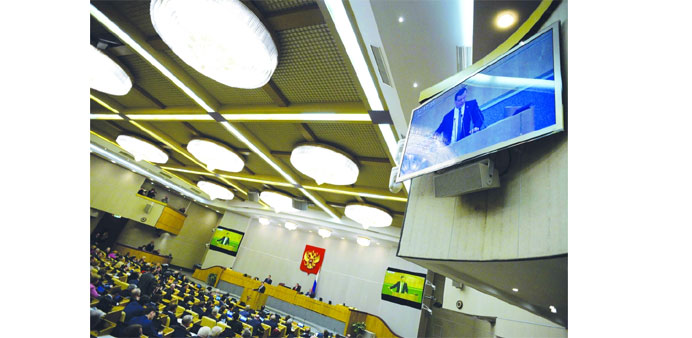Medvedev speaking in the lower house of Russian parliament, the State Duma, in Moscow.
Reuters/AFP/Brussels
The European Union is holding off imposing further sanctions on Russia for now over its actions in Ukraine until it sees if a deal reached in Geneva last week works, EU diplomats said yesterday.
EU foreign ministers agreed on April 14 to step up sanctions by expanding their list of 33 people targeted with asset freezes and visa bans for their roles in Moscow's seizure and annexation of Crimea from Ukraine in February.
But so far, although EU officials have been drawing up new names that could be added to the list, no decisions have been taken.
EU diplomats said that the reason was that the bloc wanted to allow time to see if an agreement reached in Geneva last week would work.
For the same reason, the EU has not moved any closer to imposing stricter trade and financial sanctions on Russia to punish it for its annexation of Crimea and what Western officials say is its destabilisation of eastern Ukraine.
"We are still thinking about giving the Geneva accord a little bit more time," one diplomat said.
Michael Mann, a spokesman for EU foreign policy chief Catherine Ashton, said that the process of drawing up new names to add to the sanctions list was still under way.
"Clearly throughout this discussion, what happens in terms of sanctions is very much dependent on what is happening on the ground in Ukraine," he told reporters.
EU officials would not say how long they would give the Geneva agreement to work before fresh sanctions came back on the table.
The US government said on Monday that it would decide "in days" on additional sanctions if Russia did not take steps to implement the Geneva agreement.
Under the deal signed in Geneva last week, the EU, Russia, Ukraine and the United States agreed that illegal armed groups would go home in a process to be overseen by Europe's OSCE security watchdog.
The agreement seems to be faltering with pro-Russian separatist gunmen showing no sign of surrendering government buildings they have seized in eastern Ukraine.
Moscow and Ukraine's Western-backed government have each questioned the other's compliance with the agreement.
Moscow, which denies it is orchestrating the militants in eastern Ukraine, says it could handle any tougher economic sanctions the West might impose.
The European Commission handed documents to EU member states last week explaining the potential impact on their economies of imposing stricter trade and financial sanctions on Russia.
Countries were given until yesterday to respond to the Commission, which will then tailor the package so that a decision can be taken by EU leaders if the situation in Ukraine worsens.
Meanwhile, Russian Prime Minister Dmitry Medvedev assured yesterday that Russia is ready to face a new round of Western sanctions over Ukraine.
"I am sure we will be able to minimise their consequences," he said in a televised speech to parliament. "The government is ready to act in conditions when the priority of our work becomes protecting the economy and citizens from such unfriendly acts that could follow due to the escalating foreign policy situation."
However, he acknowledged Russia's economy was facing an "unprecedented challenge".
Russia views sanctions as a "road to nowhere", Medvedev said, while insisting that the country was ready to function in isolation if necessary.
"We can of course keep on exchanging blacklists. But I don't even consider it necessary to prove from this podium that it's an absolute dead-end," he said.
"Any restrictions that are imposed on us are a primitive route. This is a road that leads nowhere, but if a number of our Western partners go along it all the same, we won't have any choice.
"Then we will manage using our own resources and we will win in the final account," he said to applause from lawmakers.

